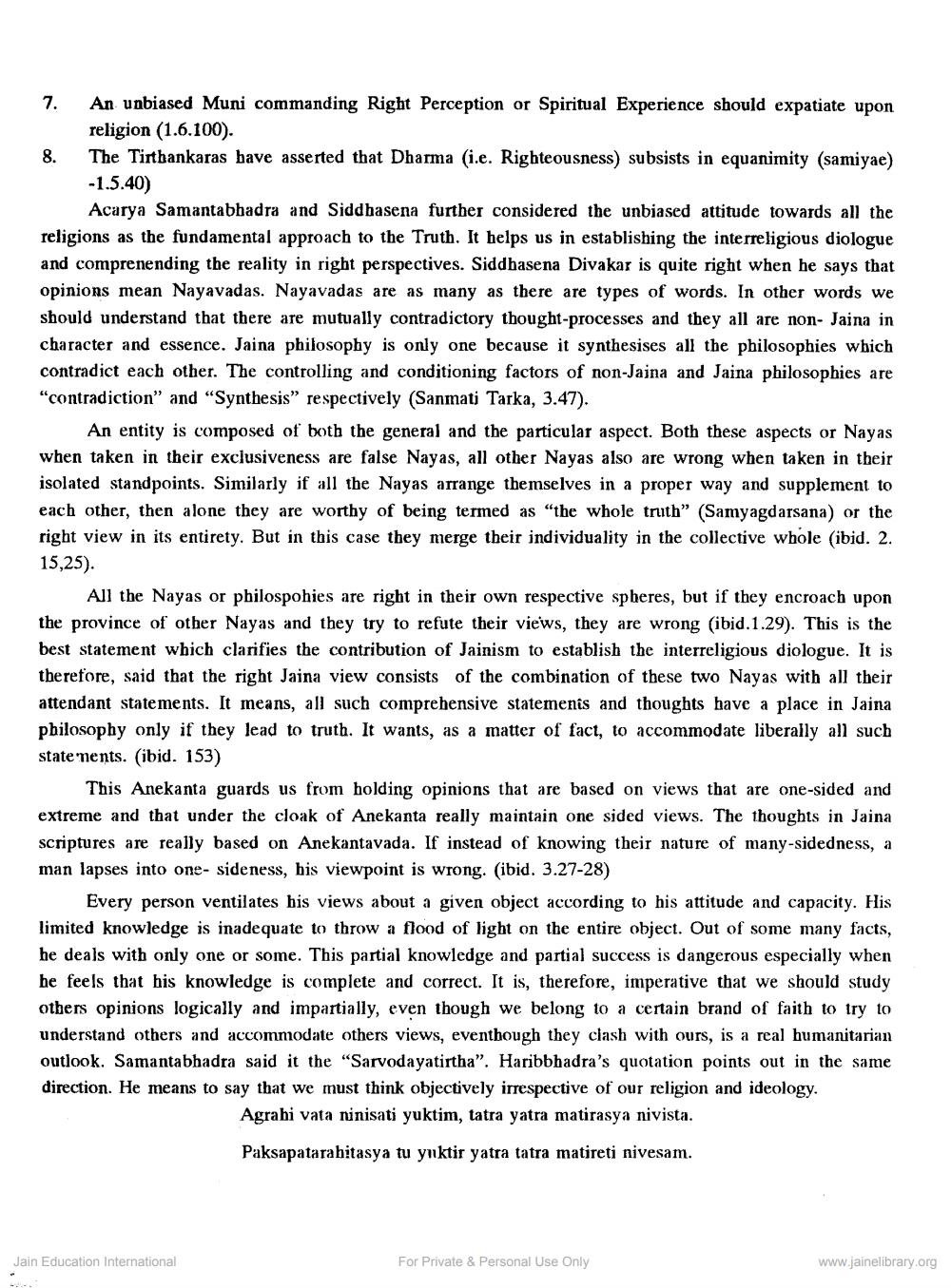________________
7. An unbiased Muni commanding Right Perception or Spiritual Experience should expatiate upon
religion (1.6.100). 8. The Tirthankaras bave asserted that Dharma (i.e. Righteousness) subsists in equanimity (samiyae)
-1.5.40)
Acarya Samantabhadra and Siddhasena further considered the unbiased attitude towards all the religions as the fundamental approach to the Truth. It helps us in establishing the interreligious diologue and comprenending the reality in right perspectives. Siddhasena Divakar is quite right when he says that opinions mean Nayavadas. Nayavadas are as many as there are types of words. In other words we should understand that there are mutually contradictory thought-processes and they all are non- Jaina in character and essence. Jaina philosophy is only one because it synthesises all the philosophies which contradict each other. The controlling and conditioning factors of non-Jaina and Jaina philosophies are "contradiction" and "Synthesis" respectively (Sanmati Tarka, 3.47).
An entity is composed of both the general and the particular aspect. Both these aspects or Nayas when taken in their exclusiveness are false Nayas, all other Nayas also are wrong when taken in their isolated standpoints. Similarly if all the Nayas arrange themselves in a proper way and supplement to each other, then alone they are worthy of being termed as "the whole truth" (Samyagdarsana) or the right view in its entirety. But in this case they merge their individuality in the collective whole (ibid. 2. 15,25).
All the Nayas or philospohies are right in their own respective spheres, but if they encroach upon the province of other Nayas and they try to refute their views, they are wrong (ibid. 1.29). This is the best statement which clarifies the contribution of Jainism to establish the interreligious diologue. It is therefore, said that the right Jaina view consists of the combination of these two Nayas with all their attendant statements. It means, all such comprehensive statements and thoughts have a place in Jaina philosophy only if they lead to truth. It wants, as a matter of fact, to accommodate liberally all such statements. (ibid. 153)
This Anekanta guards us from holding opinions that are based on views that are one-sided and extreme and that under the cloak of Anekanta really maintain one sided views. The thoughts in Jaina scriptures are really based on Anekantavada. If instead of knowing their nature of many-sidedness, a man lapses into one-sideness, his viewpoint is wrong. (ibid. 3.27-28)
Every person ventilates his views about a given object according to his attitude and capacity. His limited knowledge is inadequate to throw a flood of light on the entire object. Out of some many facts, he deals with only one or some. This partial knowledge and partial success is dangerous especially when he feels that his knowledge is complete and correct. It is, therefore, imperative that we should study others opinions logically and impartially, even though we belong to a certain brand of faith to try to understand others and accommodate others views, eventhough they clash with ours, is a real humanitarian outlook. Samantabhadra said it the "Sarvodayatirtha". Haribbhadra's quotation points out in the same direction. He means to say that we must think objectively irrespective of our religion and ideology.
Agrabi vata ninisati yuktim, tatra yatra matirasya nivista.
Paksapatara hitasya tu yniktir yatra tatra matireti nivesam.
Jain Education International
For Private & Personal Use Only
www.jainelibrary.org




